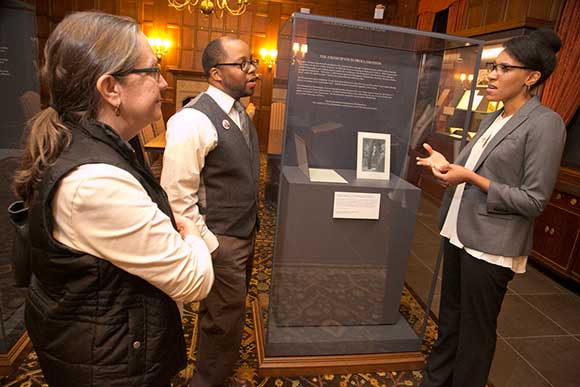
Professor Jasmine Cobb, right, talks with John Gartrell, director of the Franklin Research Center at Duke, and Paula Mangiafico of Rubenstein Library. They are in front of the copy of the Emancipation Proclamation that is on loan to Rubenstein Library.
An encounter with an actual copy of the Emancipation Proclamation offers surprises. The document looms large in American history, but its 11 paragraphs are deceptively ritualistic, written in the language of a wartime presidential order and dominated by descriptions of presidential authority. “Slaves” are mentioned only twice.
There is also a sense of disappointment, of a promise kept more in theory than in practice. For good reason, historian John Hope Franklin called the Emancipation Proclamation “a great document of American freedom that has been greatly neglected.”
On Tuesday, standing not far from an early, rare copy of the proclamation now on display in the Rubenstein Library, professor Jasmine Cobb spoke about that disappointment but also of the promise. At the core, Lincoln’s Proclamation No. 95 represents a fundamental moment of change in the United States, Cobb said.
“With this proclamation, there is a shift in the government’s relationship to African-Americans,” said Cobb, an assistant professor of African and African American Studies. She spoke before an audience of about 50 people in the Holsti-Anderson Room of the Rubenstein Library.
“The document urges us to consider the role of the government in protecting the rights and freedoms of African-Americans. With the Fugitive Slave Act of 1850, government enforced the enslavement of African-Americans across state lines. The Emancipation Proclamation was a rejoinder. It reconfigured the relationship of the government to states that held slaves.”
Cobb spoke at a ceremony marking the opening of the display of a copy purchased by Duke Trustee Chair David Rubenstein and loaned to the Rubenstein Library. (Lincoln’s original handwritten proclamation covers five pages and is currently in the National Archives.)
Duke’s one-page copy is one of nine produced in its fourth printing on Jan. 4, 1863 -- three days after it went into effect – and given to the U.S. Department of State to share with its foreign embassies for a public relations effort abroad.
One importance of the document, Cobb noted, was to legalize self-defense among African-Americans.
The proclamation limited slave emancipation to those states in rebellion against the Union. Cobb said its proclamation is very much an instrument of war, invoking Lincoln’s presidential powers as commander-in-chief.
The action is taken “to protect the nation in time of armed rebellion,” she added, and instructs the military to take action against rebellious states and recognize African-Americans as free people.
One paragraph specifically calls for African-Americans to be accepted into military service for the Union. By the end of the war, almost 200,000 black soldiers and sailors fought for their freedom.
Its political impact is more mixed. While the proclamation didn’t end slavery, it should be seen as the first in a series of steps that led to the 13th Amendment, which did end legal slavery. But Cobb said the failure of Reconstruction showed that without sufficient government will to enforce legal rights and without effective compensation for blacks, the old social and political patterns would persist regardless of constitutional change.
“W.E.B. Dubois argued that the 13th Amendment never abolished slavery,” Cobb said. “Most freeman still ended up doing same work for same wages as before and lacked the same political rights as under slavery.”
By taking such a limited approach, the constitutional amendments failed to reconstitute race relations and planted “the seeds of what we today call the ‘prison industrial complex.’ It perpetuated the very bondage that the Emancipation Proclamation was meant to abolish,” Cobb said.
But the promise of the Emancipation Proclamation received a second life through the sweeping legislation of the civil rights era, particularly the Civil Rights Act of 1964 and the Voting Rights Act of 1965, she said.
In the week in which the country celebrated Martin Luther King Jr., Cobb noted King thought Lincoln “achieved immortality by his willingness to act” on abolition.
“We should recall King’s assertion that the only way to celebrate the Emancipation Proclamation is to make its proclamations real.”
The proclamation’s lasting message, Cobb concluded, is “the centrality of African-American freedom to the stability of the nation.”
The copy is on display in the Rare Book Room, next to the Bay Psalm Book that was published in 1640 and believed to be the first book published in America.